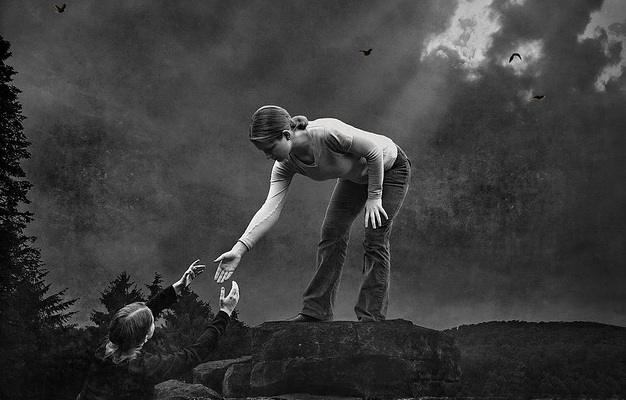
“In separateness lies the world’s great misery, in compassion lies the world’s true strength.” ~Buddha
We talk about boys these days at our dinner table.
Boys are sneaking into our home now—or at least the idea of boys. Although I love watching my daughters grow up—it’s much more fun (and much more challenging) than I ever could have imagined—I sometimes feel a certain sadness as their days of early childhood innocence slip behind us.
Their battalion of stuffed animals, for example, who were accustomed to a life of travel and adventure—and a well-dressed one at that—often live in boredom now, with only an occasional new scarf or hairdo. But I know this is the natural turn of events. I’ll get over it.
In fact, there is a juicy energy that our daughters bring back with them from their encounters with life these days. As their view of life becomes more complex and inclusive, their struggles become richer, and I am honored to both witness and participate in this process of growing up with them. And that is what it often feels like to me—growing up with them.
I know I am “the grown up” but, to be honest, I’m not always up to that title.
I often struggle with the same kind of things that they do, though my struggles may be less visible and my excuses more sophisticated. Here’s an example of what I mean.
One Saturday morning we all identified some family contributions that we were going to make. (Thanks to Parenting on Track, we now “make contributions” rather than “do chores”). One of my daughter’s contributions was to bring five pieces of wood in from the mud room for the woodstove.
We each went about our work independently, with a plan to go sledding once everyone was finished with their list. Later on, both girls let us know that they were all finished and ready to sled, so that’s what we did.
But when Gregg was beginning to make a fire that evening, he realized that all the wood at the stove were the logs that he had brought in earlier.
I heard him ask the question, “You brought in five pieces of wood?” And again, she confirmed she had. “Can you point to the ones you brought in?” he asked her. She was quiet for a moment and then said, “Oh, well…maybe I forgot to bring them in.” And when asked further, she admitted that she had lied.
I felt disappointed. While this lie was in the minor league of lies, it still was a deliberate attempt to mislead us and avoid responsibility. How long would it have taken to bring in the wood? How should I respond to this lie? When was the last time that I lied?
When was the last time that I lied—where did that question come from?! Though uninvited, this question quickly redirected my internal dialogue while taking all of the vitality out of my pointing finger.
So I began to think a bit about the issue of honesty in my own life. Oh, dear. What a distraction from my parental role—or maybe not.
Maybe this question points me in exactly the right direction.
Maybe it gives me half a chance to parent with love and compassion and to understand my children, rather than simply judge them from a lofty parental pedestal.
That’s not to say that I ignore my daughter’s dishonesty—that would not be in her best interest.
I can still set firm boundaries but I am more likely to deliver them with kindness when I am in touch with my own challenges and failings. “I know what she’s up against,” as Pema Chodron likes to say.
I have done enough self- reflection to know, intellectually, that I am not a stranger to lying. But without the immediacy of real-life details, this awareness carries little weight.
It’s not that I have been “dishonest,” it’s that I once told my Aunt Millie that I accidentally spilled nail polish remover on the top of her bureau, when in fact I deliberately started applying it to the finish to see what would happen. (It wasn’t good).
I told my father that I gave Tony’s tie clip back to him, when I really wore it proudly every day at school on my collar (I know this dates me) and then tucked it safely into my schoolbag each day before I came home. I understand lying because I have lied. If only my memories of lying stopped in my childhood.
But no, on they go, weaving in and out of my relationships for decades to come. A few weeks ago I impulsively closed down an email that I was writing to a friend, who needed some important information from me during business hours, when Gregg walked into the office. Why?
It’s curious. My instinct was to do something sneaky in order to appear innocent. It reminds me of a comic—a fellow in his nightgown who, kneeling at his bedside with eyes closed and palms together, sends up his prayer to the heavens. He pleaded, “Please protect me from the appearance of wrongdoing.”
These things often happen so fast. “Did you bring in the wood?” She who hesitates looks guilty. “Yes, I did.”
From where we stand at such pivotal moments, the appeal to mislead may feel almost irresistible, particularly when we don’t have time to think it through clearly, especially when we believe that no one would be the wiser.
How do we come to value honesty so much that we turn toward it, even when we anticipate loss of trust, esteem, or privilege? Life isn’t always as neat as we’d like it to be—that much I know.
Most of us have a fairly rich personal history with not only gossip and lying, but with all kinds of undesirable tendencies, such as impatience, greed, pride, and laziness. Most of us, if we’re honest with ourselves, will find remnants, if not reams, of the common human shortcomings in ourselves that we so dislike in others.
How, then, do we remain so judgmental and critical toward others, nailing them for failings that we dismiss or overlook in ourselves?
We don’t notice. We don’t hear the sound of our own impatient or harsh voice, as others hear it. We’re too busy, too focused on the provocation itself, too accustomed to being who we are and how we are. Our attention gets so riveted upon the dazzling transgressions of others that we lose sight of our own.
We don’t remember. We all want to feel good about ourselves, to live with a comforting self-image of which we are proud. Those memories that are in conflict with such an image can easily fade away, leaving us with a distorted perception of life.
We have a double standard. We tend to view the mistakes of others head on, under harsh spotlights, so to speak. When viewing our own situation, however, we may use a softer, more forgiving light.
So I have a new mantra to help me address this poor-memory syndrome: “Have I ever done something like that?”
Fortunately or unfortunately, depending on your perspective, the answer is almost always yes. It’s like a reverse catch-22.
In those moments when I’m living well, with integrity and responsibility, I’m benefiting, and others are, too. And when I am not living so well, we can all still benefit—as long as I remember to notice, take a breath, and transform my judgments into love.
Photo by h.koppdelaney
About Linda Anderson Krech
Linda Anderson Krech, MSW, is Program Director of the ToDo Institute. She has been practicing and teaching Japanese psychology since 1988, and now develops applications for children and families. She is the author of Little Dreams Come True: A Practical Guide to Spiritual Parenting.













 Though I run this site, it is not mine. It's ours. It's not about me. It's about us. Your stories and your wisdom are just as meaningful as mine.
Though I run this site, it is not mine. It's ours. It's not about me. It's about us. Your stories and your wisdom are just as meaningful as mine.
This is such a great post. I love the two questions you mentioned asking yourself:
When is the last time I lied?
Have I ever done something like that?
I am finding that much of my work these days is around perspective and our uncanny ability to misinterpret the people and situations in our lives without ever giving it a second thought. We don’t know we are doing it — misinterpreting, but it also never occurs to us to stop and question our interpretations.
The biggest problem with this is that everything that follows that initial (mis)interpretation is then influenced by said interpretation. This means that if our interpretation (or our perception or perspective) of a person or situation is incorrect or incomplete, so is our behavior that follows. Oops!
Way to go on waking up to this new awareness with your daughters and with yourself! It’s all about living consciously and intentionally to be our best selves and create our best lives — in our relationship with oursleves, others and the world around us!
Have an amazing weekend!
Shannon
Shannon, thanks for your comment. You’re so right — we are on automatic much of the time. If we don’t look clearly at what is happening between us and the world, we are likely to develop a distorted (and sometimes self-serving) picture of the world and our relationships. I work with a practice of self-reflection from Japan, known as Naikan, to help me maintain a more inclusive and balanced view of my life.
Hope you enjoy your weekend too!
Linda
I can see myself in your words and my own current situation:
The biggest problem with this is that everything that follows that initial (mis)interpretation is then influenced by said interpretation. This means that if our interpretation (or our perception or perspective) of a person or situation is incorrect or incomplete, so is our behavior that follows. Oops!
But how can I move from OOPS! to a more realistic perception?
Hey Cynthia,
I’m so glad my words resonated with you, and thanks for reaching out with your comment!
How can you move from OOPS! to a more realistic perspective?
I believe it is as simple as:
Living more consciously and intentionally, working to operate at a higher level of awareness and getting REALLY REALLY honest with yourself about what the truth is and what the truth is not in this current situation you mention.
ALWAYS seeking out and listening for and to ALL possible sides of truth — YOUR truth and the WHOLE truth in the situation. Then weighing the odds on which one is likely the most truthful, even if you don’t like the odds, and acting in that truth.
Your intuition, your gut, God, whatever you want to call it — it will guide your way in truth. You just have to be open and willing to listening to it.
Something came to me one time when I was having some quiet time with God and this is what He said to me, “LOOK WHERE YOU CANNOT SEE.”
I’m not sure how this might help you specifically or what your interpretation may be but I felt inclined to share!
I hope this helps!
Have an AMAZING weekend!
Shannon
http://www.girlsgetreal.com
Hi TinyBuddha community! I
could use a tip if you don’t mind 🙂 I just started my exploration into
Buddhism about two months ago..I’ve been reading as much as I can and
going to temple when I have the opportunity…one thing recently that
has come to mind is as we learn all of this about ourselves and learn to
see where our emotions and thoughts come from and learn to accept
them…how do we control the desire to not psychoanalyze everyone around
us? I know understanding where thoughts and emotions come from is how
we build compassion..but what do you do to move from what seems to be
judgement to compassion?
Hey Mindy,
For me, it came from wanting others to understand me, sometimes even despite myself. I found that I often felt misunderstood and hurt that people were misinterpreting my actions and where my heart was in those actions when I knew they were actually coming from a place of love.
I decided if I wanted people to be more understanding of me, even when I didn’t make sense to them, that I needed to be able to give the same in return. This meant really opening myself up to seeing the bigger picture and thinking openly about what might be driving another’s behavior, especially in situations that might naturally be interpreted with a judgemental heart and spirit rather than with one of compassion.
Just like anything, this gets easier with practice and eventually it really does become second nature.
I hope this helps!
Shannon
P.S. Re: psychoanalyzing: I think the difference is that this practice is not about finding answers for the other person but about opening up your own mind and finding answers for yourself. 🙂
that does help a lot Shannon! Thank you! I’m kind of in the same boat…I find that even tho my actions sometimes come from a place of love they are received by the other person in a different light. I try to stop myself when I see myself thinking “so and so would really benefit if they realized this”. It is hard!! But I’ll keep working on it 🙂
Mindy and Shannon, I can really relate to your posts. I, too, have been prone to wanting to share my wisdom because it’s been so life-changing for me. I recently saw an interview with Michael Franti, who spoke about the idea of “Don’t Convince…Connect.” I’ve been trying to put this into practice every day, through manifesting myself as love and compassion instead of talking about love and compassion…letting go of my ego’s tendency to ‘educate’ and instead just focus on BEING.
Namaste 🙂
Mindy,
I can definitely relate to what you’re asking since I practice Buddhism and am also preparing to be a therapist. One thing that is helpful to me when judgements come up is to just observe them (similar to how I treat thoughts that arise when I’m meditating). It’s almost like I’m outside of my body just watching things as an impartial third party. I remove any emotional attachment to the thoughts or judgements and just let them come and go. I also use this technique when I’m listening to someone and it helps me give them my whole attention and stay impartial.
Compassion to me is just being able to simply acknowledge that someone is hurting and wish that they would find healing. The specific reason why they’re hurting doesn’t necessarily matter, I just open myself to the fact that we are all in this together (so to speak) and the less pain we are all experiencing, the more peaceful the world will be.
Thanks for the great post!
In my experience, I judge others because I am trying to gain a sense of emotional safety. It is easier to vilify someone than be present to my own experience of pain.
What I am learning to do is to be present with and empathize with my own pain and then reach out to empathize with what the other person may be experiencing.
When we have given ourselves enough empathy, it becomes easier to be compassionate towards others.
Thanks for your comment, Karl. I think that we are hard-wired to notice the troubles that the world causes us. When we focus on the ways that others inconvenience us or make life difficult for us, it is easy to develop a judgmental tendency. Why must she be so insensitive? How could he speak to me that way?
But when we recognize that we also cause trouble, keep others waiting, speak negatively, etc., it is easier to empathize. When we are aware of our own imperfections, we are less likely to be self-righteous and judgmental. We can still be kind to ourselves, while noticing these tendencies. We are all human beings, after all!
Hopefully we can inch toward a more compassionate way of living. Life is too short to be mean!
Thanks again,
Linda
I think judgement is an important skill to learn. It involves self-protection and setting boundaries. There is, with judgement, as with everything, a happy medium. I think it’s good to know your values and your limits. It’s good to surround yourself with others who share your values. I say this as coming out of a relationship with an alcoholic – and struggling with what I would and would not allow into my home. I don’t believe that ultimately the belief that “anything goes, nobody’s perfect” will serve us well, if we cannot define our boundaries and set limits with ourselves (self-control) and with others.